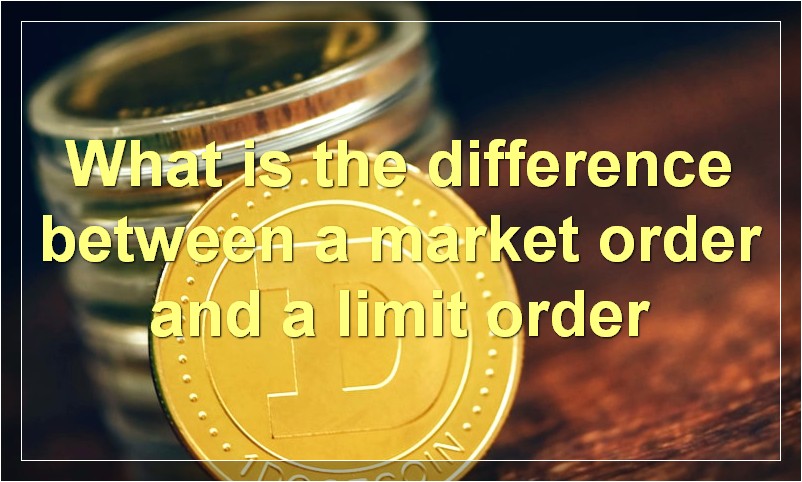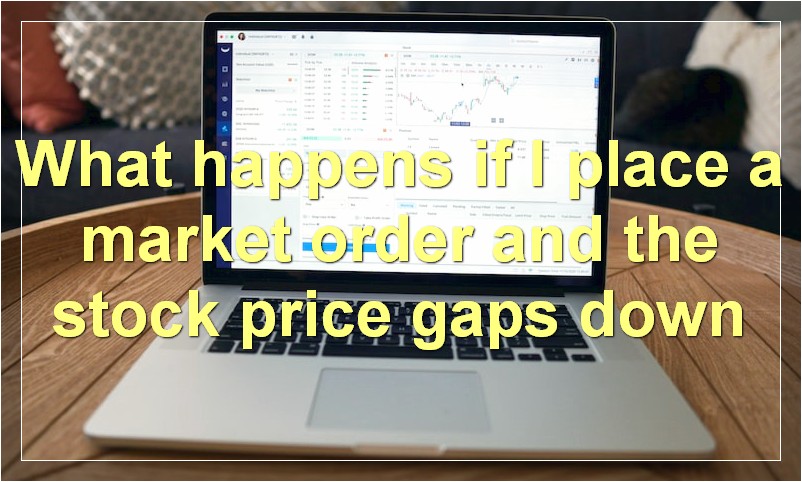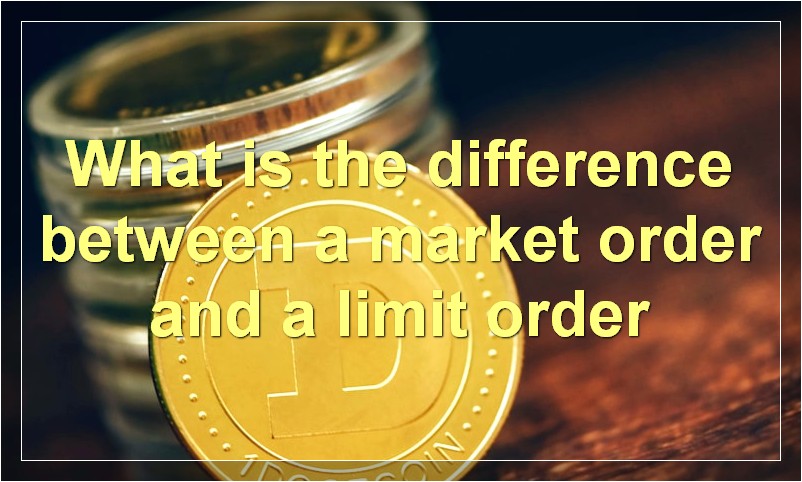A market order is an order to buy or sell a security at the best available price. Market orders are the most common type of order and are used to buy or sell securities quickly.
What is a market order
When you place a market order, you’re instructing your broker to buy or sell a security at the best available price. For example, let’s say you want to buy shares of XYZ stock. The current bid price is $10.50 and the ask price is $10.75. If you place a market order, you’ll pay $10.75 per share and your order will be filled immediately.
Market orders are the most basic type of trade and are suitable for investors who want to buy or sell a security as quickly as possible at the best available price. If you’re looking to get the best price possible, you may want to place a limit order instead.
What is the difference between a market order and a limit order

When you place a market order, you are instructing your broker to buy or sell a security at the best available price. A limit order is an order to buy or sell a security at a specific price or better.
There are pros and cons to each type of order. Market orders are executed quickly, but you may not get the price you want. Limit orders ensure that you get the price you want, but there is no guarantee that your order will be filled.
If you are trading a volatile security, it may be wise to use a limit order. If you are trading a less volatile security, a market order may be the better choice.
How do I place a market order
When placing a market order, you are instructing your broker to buy or sell a security at the best available price. Your order will be filled at the next available opportunity at the prevailing market price. Market orders are used when you want to buy or sell a security as soon as possible and are willing to accept the prevailing market price.
What are the benefits of a market order
A market order is an order to buy or sell a security at the best available price. Market orders are the most common type of order and are used when investors want to buy or sell a security as soon as possible.
There are several benefits of market orders:
-They are executed quickly
-They provide certainty of execution
-They are the simplest type of order to place
Are there any risks associated with market orders
When you place a market order, you are instructing your broker to buy or sell shares at the best available price in the current market. Your order will be filled at the next available opportunity, which means the price you pay (or receive) could be different from the last traded price.
There are a few risks associated with market orders:
-You may not get the best possible price: If the market is moving quickly, your order may not be filled at the last traded price. In a fast-moving market, you could end up paying (or receiving) more (or less) than you expected.
-Your order may not be filled: In a very volatile market, your broker may not be able to fill your order immediately. This is because they may not be able to find a willing buyer or seller at the price you’re willing to pay.
-You may incur slippage: Slippage is when you pay more (or receive less) than you expected due to the fast-moving nature of the market. This can happen when your order is filled at a different price to the last traded price.
What happens if I place a market order and the stock price gaps down

If you place a market order and the stock price gaps down, your order will be filled at the next available price. This means that you may end up paying more for the shares than you intended to.
Can I place a market order after hours
The stock market is a place where people can buy and sell stocks. The hours that the stock market is open are from 9:30 a.m. to 4:00 p.m. Eastern Standard Time. However, there are times when the stock market is closed. These times are called after hours.
During after hours, people can still buy and sell stocks. However, they cannot do so through the stock market. Instead, they have to use something called a market order. A market order is an order to buy or sell a security at the current market price.
Market orders are different from regular orders. Regular orders are only filled during regular trading hours. Market orders can be filled at any time, even when the market is closed.
There are some benefits to using a market order. For one, you can get your order filled faster. This is because there are fewer people trading during after hours. There is also less competition for trades. This means that you are more likely to get the price you want.
However, there are also some risks to using a market order. Because the market is not as active during after hours, prices can be more volatile. This means that you could end up paying more for a stock than you would during regular trading hours.
So, should you use a market order? That depends on your goals and risk tolerance. If you are looking to buy or sell a stock quickly, then a market order may be a good choice. However, if you are worried about price volatility, you may want to wait until regular trading hours to make your trade.
What is the difference between a market order and a stop order
A market order is an order to buy or sell a security at the current market price. A stop order is an order to buy or sell a security at a specified price, which is typically below the current market price for a buy stop order, or above the current market price for a sell stop order. Stop orders are used to limit losses or lock in profits.
Should I always use a limit order
There’s no simple answer to this question, as it depends on a variety of factors including the stock you’re trading, the market conditions, and your own trading goals. In general, however, using a limit order can be a good way to help ensure that you get the price you want for your trade.
How do I cancel a market order
If you placed a market order and now want to cancel it, you can do so provided that your order has not been executed. To cancel a market order, contact your broker and ask them to cancel it for you. If your broker is unable to cancel the order, you may have to wait until the order is executed.

